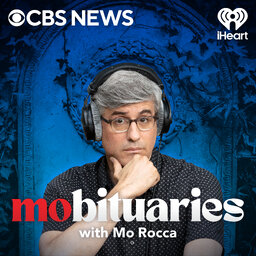The Orphan Train: Death of an American Experiment
Between 1854 and 1929, 250,000 orphans - at peril in the dangerous, overcrowded streets of New York - were placed on trains and sent west to live with new families. A desperate solution to a desperate problem, some of the stories turned out well and some far from well. The bond between the riders lives on in their descendants, many of whom continue to search for answers about their ancestry. Mo talks to the daughter of a rider, plumbs the CBS News archives for voices of the riders themselves, and tracks down the last survivor.
See Privacy Policy at https://art19.com/privacy and California Privacy Notice at https://art19.com/privacy#do-not-sell-my-info.
In 1 playlist(s)
Mobituaries with Mo Rocca
“CBS News Sunday Morning” correspondent Mo Rocca has always loved obituaries. Each episode of Mobitu…Social links
Follow podcast
Recent clips

Death of a Name | Reviving a Mobit
42:04

Marlene Dietrich Goes To War | Reviving a Mobit
13:07

Sammy Davis Jr.: Death of the Entertainer | Reviving a Mobit
50:15
 Mobituaries with Mo Rocca
Mobituaries with Mo Rocca